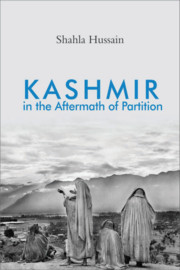Book contents
- Frontmatter
- Dedication
- Contents
- Acknowledgments
- Introduction
- 1 Meanings of Freedom in the Princely State of Jammu and Kashmir
- 2 Freedom, Loyalty, Belonging: Kashmir after Decolonization
- 3 Puppet Regimes: Collaboration and the Political Economy of Kashmiri Resistance
- 4 The Idea of Plebiscite: Discontent and Regional Dissidence
- 5 Mapping Kashmiri Imaginings of Freedom in the Inter-regional and Global Arenas
- 6 Jang-i-Aazadi (War for Freedom): Religion, Politics, and Resistance
- Conclusion
- Select Bibliography
- Index
2 - Freedom, Loyalty, Belonging: Kashmir after Decolonization
Published online by Cambridge University Press: 15 January 2021
- Frontmatter
- Dedication
- Contents
- Acknowledgments
- Introduction
- 1 Meanings of Freedom in the Princely State of Jammu and Kashmir
- 2 Freedom, Loyalty, Belonging: Kashmir after Decolonization
- 3 Puppet Regimes: Collaboration and the Political Economy of Kashmiri Resistance
- 4 The Idea of Plebiscite: Discontent and Regional Dissidence
- 5 Mapping Kashmiri Imaginings of Freedom in the Inter-regional and Global Arenas
- 6 Jang-i-Aazadi (War for Freedom): Religion, Politics, and Resistance
- Conclusion
- Select Bibliography
- Index
Summary
O golden oriole, winter's gone,
Gay spring has come again!
Step out and feast your weary eyes
On the myriad flowers a bloom.
Flowering plants have spread their arms;
Perch on the bough your fancy takes;
But with an alien as your gardener,
This freedom won't remain.
The Wular Lake is still in flood,
The North Wind howling strong;
The shore is far away, and you
Must steer your course with care!
—Ghulam Ahmad Mahjoor, “O Golden Oriole!”For the inhabitants of the former princely state of Jammu and Kashmir, freedom came at a price. The Indian–Pakistani battle for sovereignty over the territory turned the Kashmir question into an international dispute and led to the drawing of an arbitrary ceasefire line dividing the province. War, violence, and displacement led Kashmiris to believe that their much-awaited freedom still eluded them. Kashmiri society battled this turmoil during the 1950s as it tried to come to grips with not only the presence of the Indian and Pakistani states, but also Kashmiris’ own place within these new political constructs.
This chapter explores the immediate aftermath of decolonization, during which India and Pakistan, aided by local political elites, sought to legitimize their rule over their respective sides of Kashmir. Meanwhile, the United Nations’ promise of a plebiscite to resolve the area's disputed status created ambiguity about Kashmir's future, making Kashmiris question whether they had a place in either of the newly created nation-states. For over seventy years, questions of belonging and loyalty for various communities living on both sides of the ceasefire line and how they imagined their role in the politics of postcolonial Kashmir have sparked a debate. To what extent is their belonging rooted in a political, regional, or cultural sense of identity? Some have argued that the loyalty of Kashmiri Muslims lay with Pakistan because of their supposedly shared religious sensibilities. This view has been bolstered not only by Pakistani nationalist writings, but also by devotees of India's Hindu right. Indian and Kashmiri nationalist discourses, in contrast, have characterized Kashmir as a land devoid of religious discord. This articulation of Kashmiriyat emphasizes the secular spirit of Kashmiris to justify the decision of the National Conference to support Kashmir's accession to India. Research on the present political turmoil in Kashmir draws from these two classifications of Kashmiri identity as well.
- Type
- Chapter
- Information
- Kashmir in the Aftermath of Partition , pp. 77 - 131Publisher: Cambridge University PressPrint publication year: 2021



